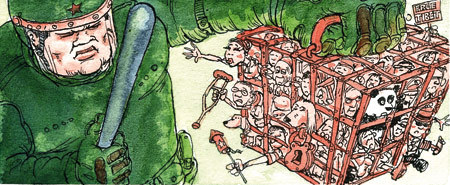Beijing Olympics
Limbering up for the games
From The Economist print edition

The security forces rehearse their exercise routine
PETS, prostitutes and prospective political protesters should consider themselves forewarned. The Chinese authorities, doggedly determined to ensure a safe environment for the Beijing Olympics in August, and to avoid surprises or embarrassments, have them in their sights.
No one dismisses the security concerns. With the ever-present threat of terrorism and a number of foreign leaders, among them George Bush, expected to attend the games' opening ceremony, China has no choice but to take security seriously. But the clampdown now under way suggests the government is just as concerned about preventing anything—from political demonstrations to unsightly beggars—that reflects poorly on it, however slightly. The risk is that heavy-handed precautions will take the fun out of what is supposed, after all, to be a sporting event.
Some new restrictions seem reasonable. For three months, for example, fireworks will be banned. Lorries entering Beijing have been coming under closer inspection. So has the mail. Police raids have been stepped up at night-spots, beauty salons and karaoke parlours, which often serve as fronts for prostitution. The press has reported that officials are especially worried about an influx of foreign prostitutes hoping to cash in on the Olympic boom, and that they have launched a campaign to prevent it.
But other measures smack of overkill. Beggars and disabled people have been ordered, and in some cases forced, off the streets. Those from outside Beijing have been threatened with detention unless they go home until the games are over. In your correspondent's own neighbourhood, residents have been told they may walk their dogs only at certain, strictly limited, times of day—and the dogs must carry their papers at all times.
Documents are posing problems for people, too. In one especially damaging consequence of the crackdown, China has tightened visa procedures for foreign visitors of all sorts. Businessmen used to speedy visas are now suffering delays and refusals. Chambers of commerce from Europe, North America, Australia and India are complaining bitterly about trips aborted and business lost.
Long-time foreign residents are faring no better. Visa renewals are no longer routine. Applicants may be told to undertake costly travel and submit their paperwork at Chinese embassies in their home countries. Others are simply told not to bother and to plan instead on being elsewhere.
Authorities have also served notice that Olympic visitors will themselves be carefully watched. A helpful “legal guide” tells foreign athletes, officials, reporters and spectators how to behave. In addition to shunning narcotics, weapons and counterfeit currency, they should abjure “subversive activities” or the “display of religious, political or racial banners”. Of course China does not normally allow those things anyway and, having staked so much prestige on the games, is in no mood to loosen up now. Recent events have only hardened attitudes. After deadly riots in Tibet in March, China's global Olympic-torch relay attracted boisterous protests around the world against a wide range of Chinese human-rights practices. Authorities are keen to prevent any such outbursts on their home turf.
They will probably fail, if only because of the huge number of visitors and the determination of some to make a statement. But ponderous attempts to keep control may dampen the Olympic mood. An ungracious host may give visitors one more reason to protest.


 留言列表
留言列表
